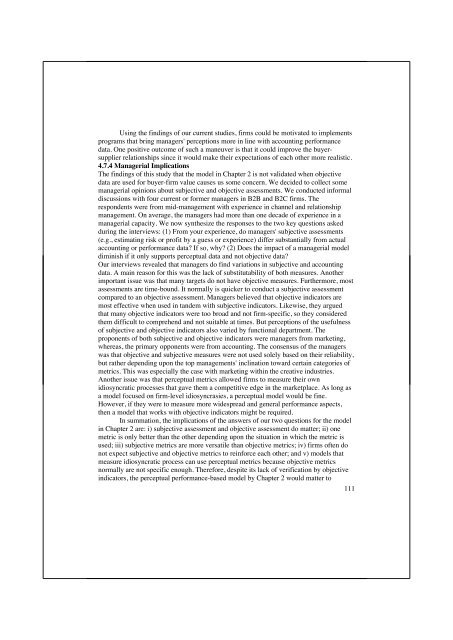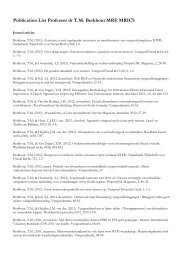Essays on supplier responsiveness and buyer firm value - Nyenrode ...
Essays on supplier responsiveness and buyer firm value - Nyenrode ...
Essays on supplier responsiveness and buyer firm value - Nyenrode ...
Create successful ePaper yourself
Turn your PDF publications into a flip-book with our unique Google optimized e-Paper software.
Using the findings of our current studies, <strong>firm</strong>s could be motivated to implements<br />
programs that bring managers' percepti<strong>on</strong>s more in line with accounting performance<br />
data. One positive outcome of such a maneuver is that it could improve the <strong>buyer</strong><strong>supplier</strong><br />
relati<strong>on</strong>ships since it would make their expectati<strong>on</strong>s of each other more realistic.<br />
4.7.4 Managerial Implicati<strong>on</strong>s<br />
The findings of this study that the model in Chapter 2 is not validated when objective<br />
data are used for <strong>buyer</strong>-<strong>firm</strong> <strong>value</strong> causes us some c<strong>on</strong>cern. We decided to collect some<br />
managerial opini<strong>on</strong>s about subjective <strong>and</strong> objective assessments. We c<strong>on</strong>ducted informal<br />
discussi<strong>on</strong>s with four current or former managers in B2B <strong>and</strong> B2C <strong>firm</strong>s. The<br />
resp<strong>on</strong>dents were from mid-management with experience in channel <strong>and</strong> relati<strong>on</strong>ship<br />
management. On average, the managers had more than <strong>on</strong>e decade of experience in a<br />
managerial capacity. We now synthesize the resp<strong>on</strong>ses to the two key questi<strong>on</strong>s asked<br />
during the interviews: (1) From your experience, do managers' subjective assessments<br />
(e.g., estimating risk or profit by a guess or experience) differ substantially from actual<br />
accounting or performance data? If so, why? (2) Does the impact of a managerial model<br />
diminish if it <strong>on</strong>ly supports perceptual data <strong>and</strong> not objective data?<br />
Our interviews revealed that managers do find variati<strong>on</strong>s in subjective <strong>and</strong> accounting<br />
data. A main reas<strong>on</strong> for this was the lack of substitutability of both measures. Another<br />
important issue was that many targets do not have objective measures. Furthermore, most<br />
assessments are time-bound. It normally is quicker to c<strong>on</strong>duct a subjective assessment<br />
compared to an objective assessment. Managers believed that objective indicators are<br />
most effective when used in t<strong>and</strong>em with subjective indicators. Likewise, they argued<br />
that many objective indicators were too broad <strong>and</strong> not <strong>firm</strong>-specific, so they c<strong>on</strong>sidered<br />
them difficult to comprehend <strong>and</strong> not suitable at times. But percepti<strong>on</strong>s of the usefulness<br />
of subjective <strong>and</strong> objective indicators also varied by functi<strong>on</strong>al department. The<br />
prop<strong>on</strong>ents of both subjective <strong>and</strong> objective indicators were managers from marketing,<br />
whereas, the primary opp<strong>on</strong>ents were from accounting. The c<strong>on</strong>sensus of the managers<br />
was that objective <strong>and</strong> subjective measures were not used solely based <strong>on</strong> their reliability,<br />
but rather depending up<strong>on</strong> the top managements' inclinati<strong>on</strong> toward certain categories of<br />
metrics. This was especially the case with marketing within the creative industries.<br />
Another issue was that perceptual metrics allowed <strong>firm</strong>s to measure their own<br />
idiosyncratic processes that gave them a competitive edge in the marketplace. As l<strong>on</strong>g as<br />
a model focused <strong>on</strong> <strong>firm</strong>-level idiosyncrasies, a perceptual model would be fine.<br />
However, if they were to measure more widespread <strong>and</strong> general performance aspects,<br />
then a model that works with objective indicators might be required.<br />
In summati<strong>on</strong>, the implicati<strong>on</strong>s of the answers of our two questi<strong>on</strong>s for the model<br />
in Chapter 2 are: i) subjective assessment <strong>and</strong> objective assessment do matter; ii) <strong>on</strong>e<br />
metric is <strong>on</strong>ly better than the other depending up<strong>on</strong> the situati<strong>on</strong> in which the metric is<br />
used; iii) subjective metrics are more versatile than objective metrics; iv) <strong>firm</strong>s often do<br />
not expect subjective <strong>and</strong> objective metrics to reinforce each other; <strong>and</strong> v) models that<br />
measure idiosyncratic process can use perceptual metrics because objective metrics<br />
normally are not specific enough. Therefore, despite its lack of verificati<strong>on</strong> by objective<br />
indicators, the perceptual performance-based model by Chapter 2 would matter to<br />
111
















